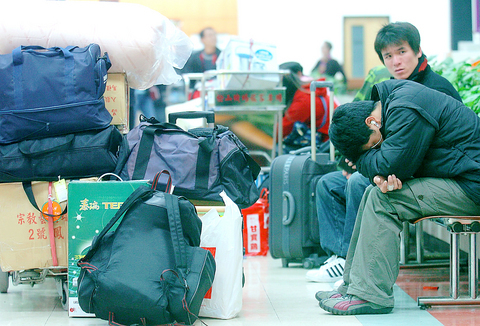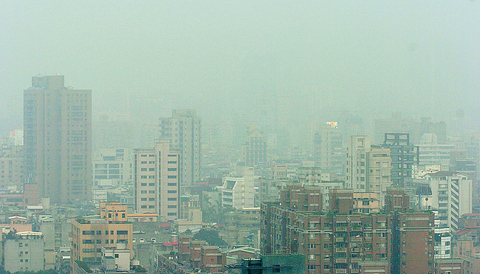With the western part of the country still buried under a thick layer of fog which paralyzed air transportation on Sunday, officials at CKS International Airport said yesterday that, although further delays are expected, they hope to get schedules back to normal today.
"At 11:30am, 38 flights were delayed and two cancelled. We hope that the airport will be able to digest the backlog by today," the airport's deputy director Liu Chuang-sheng (

PHOTO: JIAN RONG-FENG, TAIPEI TIMES
The bank of fog disrupted domestic and international air travel on Sunday, affecting 150 flights and more than 20,000 passengers. Some passengers were forced to stay at the airport overnight after checking in.

PHOTO: GEORGE TSORNG, TAIPEI TIMES
Officials said the airport is now operating more smoothly. Passengers have started boarding and most flights are arriving on time.
A few international flights were still delayed or cancelled yesterday. Some flights to Tokyo, Phuket, Hong Kong and Macau were cancelled, while flights to Southeast-Asian cities like Manila, Jakarta, Kuala Lumpur, Ho Chi Minh City and others like Delhi, Nagoya and Los Angeles have been rescheduled.
As heavy fog is likely to affect air transportation for the next few days, Liu advised passengers to contact airlines to confirm flight times, or check the Web site www1.cksairport.gov.tw/english.
"At this festive time of the year, travelers wish to get to their destination as quickly as possible. We understand this and urge passengers to check with airlines first. We will rearrange flights to take passengers home before Lunar New Year's Eve on Tuesday," Liu said.
Some passengers in Macau were furious when Eva Air's flight BR-806 was delayed for 12 hours because some passengers apparently refused to board. When they arrived in Taipei yesterday morning, more than 200 passengers refused to leave the plane and demanded to be compensated for the inconvenience.
After mediation by members of the aviation police, Eva Air agreed to give NT$2,500 back to each of the passengers. Most passengers were satisfied and left, although a few stayed behind in the departure lounge demanding an apology.
The airline said that the delay was caused by weather factors beyond its control.
"The airline is the biggest victim of the bad weather. We humbly ask our customers to understand and cooperate with us so that further delays can be averted," Eva Air said in its news release.
The Consumer's Foundation called on passengers and airlines to establish a negotiation mechanism about disputes.
"The delays were caused by the weather, but airlines' attitude plays a key role in resolving disputes with their costumers. We must have a constant negotiation mechanism so that both sides can argue their cases reasonably. Otherwise, both sides would only hastily wrap things up with whimpers," said Cheng Jen-hung (程仁宏), vice chairman of the Consumers' Foundation.
Meanwhile, the Central Weather Bureau extended its fog warning and forecast that fog and mist are likely to continue to blanket western areas throughout the Lunar New Year holiday.
Heavy fog, coming from the southeastern coast of China, will loom over western cities, resulting in reduced visibility.
"Motorists should heed weather reports and exercise more caution when they take to the highways," the forecast center's deputy director Daniel Wu (

The US government has signed defense cooperation agreements with Japan and the Philippines to boost the deterrence capabilities of countries in the first island chain, a report by the National Security Bureau (NSB) showed. The main countries on the first island chain include the two nations and Taiwan. The bureau is to present the report at a meeting of the legislature’s Foreign Affairs and National Defense Committee tomorrow. The US military has deployed Typhon missile systems to Japan’s Yamaguchi Prefecture and Zambales province in the Philippines during their joint military exercises. It has also installed NMESIS anti-ship systems in Japan’s Okinawa

TRAGEDY STRIKES TAIPEI: The suspect died after falling off a building after he threw smoke grenades into Taipei Main Station and went on a killing spree in Zhongshan A 27-year-old suspect allegedly threw smoke grenades in Taipei Main Station and then proceeded to Zhongshan MRT Station in a random killing spree that resulted in the death of the suspect and two other civilians, and seven injured, including one in critical condition, as of press time last night. The suspect, identified as a man surnamed Chang Wen (張文), allegedly began the attack at Taipei Main Station, the Taipei Fire Department said, adding that it received a report at 5:24pm that smoke grenades had been thrown in the station. One man in his 50s was rushed to hospital after a cardiac arrest

‘WIN-WIN’: The Philippines, and central and eastern European countries are important potential drone cooperation partners, Minister of Foreign Affairs Lin Chia-lung said Minister of Foreign Affairs Lin Chia-lung (林佳龍) in an interview published yesterday confirmed that there are joint ventures between Taiwan and Poland in the drone industry. Lin made the remark in an exclusive interview with the Chinese-language Liberty Times (the Taipei Times’ sister paper). The government-backed Taiwan Excellence Drone International Business Opportunities Alliance and the Polish Chamber of Unmanned Systems on Wednesday last week signed a memorandum of understanding in Poland to develop a “non-China” supply chain for drones and work together on key technologies. Asked if Taiwan prioritized Poland among central and eastern European countries in drone collaboration, Lin

ON ALERT: Taiwan’s partners would issue warnings if China attempted to use Interpol to target Taiwanese, and the global body has mechanisms to prevent it, an official said China has stationed two to four people specializing in Taiwan affairs at its embassies in several democratic countries to monitor and harass Taiwanese, actions that the host nations would not tolerate, National Security Bureau (NSB) Director-General Tsai Ming-yen (蔡明彥) said yesterday. Tsai made the comments at a meeting of the legislature’s Foreign Affairs and National Defense Committee, which asked him and Minister of National Defense Wellington Koo (顧立雄) to report on potential conflicts in the Taiwan Strait and military preparedness. Democratic Progressive Party (DPP) Legislator Michelle Lin (林楚茵) expressed concern that Beijing has posted personnel from China’s Taiwan Affairs Office to its